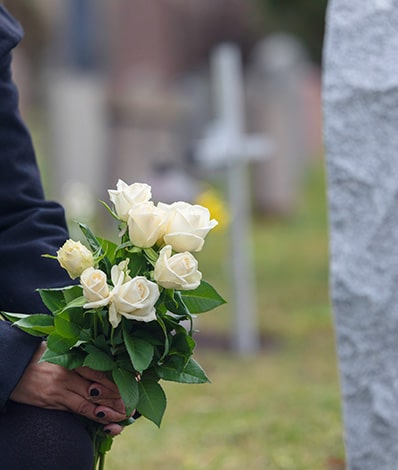Menu
Wrongful Death
Aggressive Advocacy for Wrongful Death Claims in Massachusetts
If a loved one has died or was killed as a result of another's negligence, you may be entitled to financial compensation by pursuing a wrongful death claim and holding any responsible parties accountable. By pursuing a wrongful death claim, you and your family may be awarded damages to cover expenses and losses such as funeral costs, lost wages, medical bills, pain and suffering, loss of consortium and loss of companionship.
To learn more about filing a wrongful death claim, reach out to Attorney Rick Madore today and schedule a free consultation. We will diligently review your case and help you and your family get the justice they deserve.
Knowledgeable Attorney for Families Affected by Wrongful Death
A wrongful death claim can arise when an individual dies or is killed as a result of the negligence or wrongdoing of another. For example, you may be able to file a wrongful death lawsuit if your spouse dies from a botched surgery or was killed in a car accident. Like other lawsuits, wrongful death claims can be filed against an individual, a business and a government agency.
Only certain individuals can file wrongful death claims in Massachusetts. Under Chapter 229, Section 2 of the Massachusetts General Laws, wrongful death claims can only be brought by the executor or administrator of a deceased person's estate.
Helping You Recover the Compensation You Deserve
Under Chapter 229, Section 2 of the Massachusetts General Laws, surviving family members of wrongful death victims may be entitled to economic damages, non-economic damages and punitive damages.
Economic Damages
Economic damages are tangible expenses that are based on a concrete amount of money. Examples include:
- Lost wages and future earnings;
- Medical bills;
- Loss of an inheritance as a result of the untimely death;
- Funeral and burial expenses;
- Loss of benefits, such as medical coverage or pension plans.
Most economic expenses can be easily calculated such as medical bills and funeral expenses. However, some are more difficult to ascertain. To illustrate, here's how three categories of lost wages and future earnings are determined in wrongful death cases:
- Lost wages from the date of injury to the time of death. These damages can easily be proven through recent paystubs and W-2 forms. Alternatively, paystubs and bank statements can be used to prove damages if a loved one was self-employed or earned commissions.
- Lost future income. This is determined by multiplying the victim's income at the time of death by the victim’s work life expectancy. Reasonable bonuses and raises can be included in this calculation. An expert is usually hired to assist in calculating these damages.
- Lost earnings for the victim's retirement years. This category consists of the income the deceased would have received during their retirement years. Social Security income estimates and life expectancy tables are usually used to determine these damages. An expert is usually hired to assist in calculating these damages.
Non-Economic Damages
Unlike economic damages, non-economic damages are intangible and hard to translate into monetary values. They're also harder to calculate. Common examples include:
- Loss of companionship or consortium: These damages are meant to compensate for the loss of companionship, affection, comfort, guidance, and love of a deceased family member. Loss of companionship refers to the loss suffered by children who lose a parent, while consortium typically refers to the loss of a spouse.
- Pain and suffering: These damages refer to the physical and emotional consequences of losing a family member, such as anxiety, depression, insomnia, post-traumatic stress disorder and loss of enjoyment of life.
Punitive Damages
According to Chapter 229, Section 2 of the Massachusetts General Laws, punitive damages of $5,000 or more may be awarded if the deceased's death was caused by the malicious, reckless, wanton, willful, or grossly negligent conduct of a defendant.
Ensuring Your Family Gets the Justice They Deserve
Although it's difficult to assign monetary value to human life, wrongful death cases require parties to determine the value of the victim's life. If a wrongful death lawsuit goes to trial, a jury will look at the circumstances of the death and at the following to determine the amount of damages to award:
- The deceased's age
- The deceased's physical health
- The deceased's income at the time of death
- The victim's future earning potential
- Lost benefits, such as pension and health insurance
- The victim's medical bills
- The cause and manner or death
- Whether the victim suffered before dying
In a wrongful death claim, damages must be supported by evidence. Attorney Rick Madore utilizes expert witnesses to analyze these factors and pinpoint the compensation that should be awarded.
Massachusetts Wrongful Death Statute of Limitations
In Massachusetts, a decedent's estate has three years from the time of death to file a wrongful death lawsuit, with several limited exceptions to this time limit. If a decedents estate does not file a lawsuit within the allowed time frame, the estate will be forever barred from doing so by the statute of limitations.
Contact Attorney Rick Madore For a Free Review Of Your Case Today
Contact our office today to learn more about your legal options. Attorney Rick Madore will provide you with a thorough review of your case and guide you on the next steps that should be taken to protect you and your families rights. We handle wrongful death claims throughout Massachusetts.


